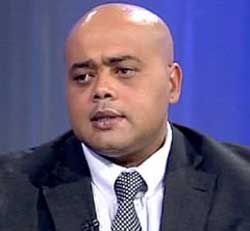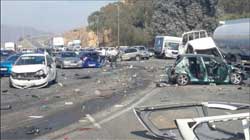The Road Accident Fund (RAF) paid a record R22.2bn to people who survived vehicle accidents in the 2013/14 financial year.

RAF's Eugene Watson says a record R22.2bn was paid out to claimants by the RAF in the previous financial year but points out that there are still 232,285 claims waiting to be resolved. Image:
News Lookup"In the 2013/14 financial year, the number of open claims reduced year-on-year to what is now less than half of what it was five years ago, indicating that administration is more efficient," said RAF Chief Executive Eugene Watson.
"In the period under review, the number of open and reopened claims reduced from 212,085 to 198,140 and the total number of people awaiting compensation or legal cost payments reduced by 47,627 from 279,912 to 232,285.
He said the RAF has improved it internal productivity and controls and expanded its geographical footprint to make its services more readily available to all road accident victims.
According to Watson, this is as a result of management interventions to improve claim payments, introduce more efficient business processes, provide additional staff and implement alternative claims administration methods.
While the rising provision for outstanding claims continues to place a strain on the RAF's financial resources, Watson said the organisation has remained committed to assessing and finalising claims quickly and efficiently.
Imperative to reduce fatalities on SA's roads
The Auditor-General gave the RAF's its second consecutive clean audit for the 2013/14 financial year.
"Reducing the frequency, severity and impact of accidents is the Fund's highest priority, as the estimated cost of road crashes to South Africa's economy remains staggeringly high at R306bn a year.

With at least 14,000 people dying on SA's roads every year, the traffic authorities have to improve road safety as this will also reduce the burden on the RAF when in comes to paying compensation claims to victims or road accidents. Image:
SA Breaking News"Despite this, the RAF will continue being the social security safety net for those who are maimed on SA's roads," Watson said.
He said over 7,000 funeral claims were paid by the RAF, roughly half of the more than 14,000 road fatalities on South Africa's roads each year.
The RAF Board and management remain committed to implementing plans that will curb the growing deficit caused by the rising provision for outstanding claims.
Funding problems remain
These plans include engaging the National Treasury and the Department of Transport on an on-going basis to resolve the short-, medium- and long-term funding problems facing the organisation.
However, Watson said a major challenge is that contingency fees in excess of an estimated 25% continue to be paid to attorneys, exacerbating the hardship accident victims suffer. In addition, 21% of total payments to claimants are still for legal fees, with R1.7bn spent by the RAF on legal costs and R2.9bn on claimant's legal costs.
"Consequently, the litigious nature of the adversarial compensation scheme where one needs to prove fault, and the subjectivity in determining loss-of-earnings and support benefits, has seen a claim take between 12 and 60 months to resolve," he said.
The Road Accident Benefit Scheme (RABS) Bill will address these challenges by eliminating the need to determine who was at fault, thus cutting out prolonged and often self-serving litigation.
In terms of the Scheme, payments will be made directly and on a monthly basis to claimants and medical or healthcare service providers.






























